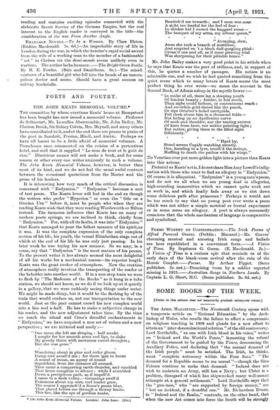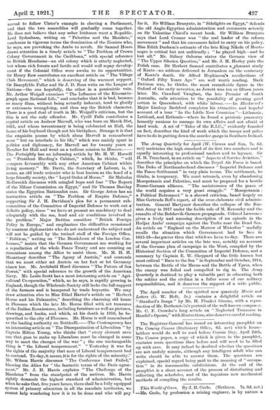SOME BOOKS OF THE WEEK.
[Notice in this column does not necessarily preclude subsequent review-1 Tau APRIL MAGAZINES.—The Nineteenth Century opens with a temperate article on " National Education " by the Arch- bishop of Wales, who recalls the failure to effect a compromise on religious teaching in 1908 and pleads for a new effort to attain an " inter-denominational solution " of the old controversy. Lord Northcliffe, " as one with Irish blood in his veins," writes on " Ireland and the World's Peace," lamenting the refusal of the Government to be guided by the Times, denouncing the Auxiliary Police, and declaring that " the normal demand of the Irish people " must be satisfied. The Irish, he thinks, want " complete autonomy within the Four Seas." " The demand for a Republic seems to me unreal "—though the Sinn Feiners continue to make that demand. " Ireland does not wish to maintain an Army, still less a Navy ; but Ulster is a problem, disregard of which has shipwrecked many well-meant attempts at a general settlement." Lord Northcliffe says that the " gun-men," who " are supported by foreign money," are " but an incident, if a dreadful one." Mr. Richardson Evans, in " Ireland and the Realm," contends, on the other hand, that when the new Act comes into force the South will be strongly moved to follow Ulster's example in electing a Parliament, and that the two assemblies will gradually come together. He does not believe that any sober Irishmen want a Republic. Lord Sydenham, writing on " Palestine and the Mandate," condemns in vigorous terms the domination of the Zionists who, he says, are provoking the Arabs to revolt. Sir Samuel Hoare draws attention in a timely article to " The Problem of Crown Colony Government in the Caribbean," with special reference to British Honduras—an old colony which is utterly neglected, but whose rich forests and fertile soil would well repay develop- ment if the Colonial Office were awake to its opportunities. Sir Henry Rew contributes an excellent article on " The Village Club Movement," which is deserving of the warmest support. Sir Bampfylde Fuller and Sir J. D. Rees write on the League of Nations—the one hopefully, the other in a rw 'inistic vein. Mr. Arthur Weigall examines " The Influence of the Kinemato- graph upon National Life," and concludes that it is bad, because so many films, without being actually indecent, tend to glorify or extenuate wrongdoing, and thus sap the British character. There is a good deal of truth in Mr. Weigall's criticism, but the film is not the only offender. Mr. Cyrill Falls contributes a capital article on Andrew Marvell, who was born on March 31st, 1621, and whose tercentenary is being celebrated at Hull, the home of his boyhood though not his birthplace. Strange it is that the exquisite poems by which alone Marvell is remembered were " but an interlude in his life," which was mainly spent in politics and diplomacy, for Marvell sat for twenty years as Member for Hull and went on a tedious mission to Moscow.— The Fortnightly has an informing article by Mr. H. W. Horwill on "President Harding's Cabinet," which, he thinks, " will compare favourably with any other American Cabinet within living memory." Mr. Davis, the Secretary of Labour, is, it seems, an old trade unionist who is best known as the head of a large friendly society, the " Loyal Order of Moose." Sir Malcolm alcllwmith discusses with mingled hope and fear " The Report of the Milner Commission on Egypt," and Sir Thomas Barclay states the Egyptian Nationalist case. Sir George Aston has an instructive article on " The Problem of Empire Defence," supporting Sir J. H. Davidson's plea for a permanent sub- committee of the Committee of Imperial Defence to work out a' definite policy, since " we have at present no machinery to deal adequately with the sea, land and air conditions involved in the problem." Major Battine considers " British Foreign Policy in Europe," and emphasizes the difficulties occasioned by amateur diplomatists who do not understand the subject and will not be guided by the trained staff of the Foreign Office. " Politicus," writing on " The Breakdown of the London Con- ference," insists that the German Government are working for a repudiation of the whole Peace Treaty and are counting on dissensions among the Allies to assist them. Mr. M. H. H. Macartney describes " The Agony of Austria," and contends that we must either set Austria on her feet or let Germany annex her. Mr. Archibald Hurd discusses " The Future of Sea Power," with special reference to the growth of the American Navy. Mr. Leslie Scott has a most interesting article on " Agri- cultural Co-operation," which, as he says, is rapidly growing in England, though the Wholesale Society still lacks the full support of the farmers and is hampered by trade boycotts. We may draw attention also to Miss Ethel Harter's article on " Herbert Home and his Palazzetto," describing the charming old house in Florence which the late Mr. Home filled with art treasures of the Italian Renaissance, including furniture as well as pictures, drawings, and books, and which, at his death in 1916, he be- queathed to the city of Florence. Mr. Home is well remembered as the leading authority on Botticelli.—The Contemporary has an interesting article on " The Disorganisation of Liberalism " by Captain Hilton Young, who thinks that " every element save one that goes to make up Liberalism must be changed in some way to meet the changes of the war " ; the one unchangeable thing is " the Liberal temperament." " Yesterday it was for the rights of the majority that men of Liberal temperament had to contend. To-day; it seems, it is for the rights of the minority." Mr. Wilson Harris discusses " The Conference that Failed," blaming the Allies for " the fantastic terms of the Paris agree- ment." Mr. J. H. Harris explains " The Challenge of the Mandates " from the standpoint of the natives. Mr. Harris rightly demands the highest standard of administration, but when he asks that, five years hence, there shall be a fully equipped system of primary education in all the mandate territories, we cannot help wondering how it is to be done and who will pay for it. Sir William Brunyate, in " Sidelights on Egypt," defends the old Anglo-Egyptian administration and comments severely on Sir Valentine Chirol's recent book. Sir William Brunyate says that Lord Cromer was " the real leader of the reform movement " and that his successors failed to carry on his policy. Miss Edith Durham's estimate of the late King Nikola of Monte- negro is critical but not unfriendly ; " he played high—and he lost all." Mr. Sidney Osborne states the German view of " The Upper Silesian Question," and Mr. J. H. Harley puts the Polish case. Sir Herbert Samuel contributes a ,pleasant study of Keats—an address delivered in Jerusalem on the centenary of Keats's death. Sir Alfred Hopkinson's recollections of " Oxford Fifty Years Ago " are well worth reading. Mark Pattison was, he thinks, the most remarkable figure in the Oxford of the early seventies, as Jowett was ten or fifteen years later. Mr. Crawford Vaughan, the late Premier of South Australia, calls attention to the possibility of growing good cotton in Queensland, with white• labour.—In Blackumd'a Major Lindsay Bashford completes his attractive and hopeful account of a tour " In the Little New Countries "—Lithuania, Lettland, and Esthonia—where he found a patriotic peasantry honestly anxious to manage its own affairs and not afraid of hard work. A set of " Tales of the R.I.C.," evidently founded on fact, describes the kind of work which the troops and police have to do in putting down the murder-gangs in Southern Ireland.



































 Previous page
Previous page